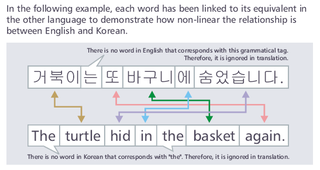A few weeks ago, I was contacted by a former client asking how to market his ESL website to Korean consumers. He’s tried various online approaches which haven’t worked and my previous article discussed that in detail, including some concise tips at Korea Business Central)
In addition to the online aspects of his efforts, he also asked about how to connect to his market offline:
…To help my chances, I’d like to begin searching for someone in Korea who can help. This person might act as a recruiter, or even work together to launch a new online ESL business. I’m keeping a very open mind on this. So, if you think you might know anyone who’d be interested or can advise me on where to begin looking, please let me know.
Here’s my answer:
As I pointed out in my previous post, the market for ESL education in Korea is big, but crowded. I don’t think an online-only approach is likely to work in Korea for various reasons. I agree with your conclusion that you need someone on the ground to support you offline. I suspect that “someone” may need to be you, as I’ll explain below.
The first reason you can’t just market online is simply that there are so many ESL websites out there that, to get seen in your market, you’ve got to stand out from the crowd with a strategy that does more than just throw time and money at Google, Naver and Daum.
But beyond that, while there may be a few lone rangers in Korea who are bypassing the offline options and are going to the Internet to resolve their English learning needs, the vast majority of Korean language learners start their search with resources closer to home.
Furthermore, the average student doesn’t just call up institutes and English teachers in the local phone book; he/she goes where his/her friends are studying (for kids) or where his/her co-workers are studying (for adults). Though I’m not prepared to say with confidence that this is unique to Korea (or East Asia) because of the group-oriented culture (though this might be an aggravating factor), the normal way for someone to get into the English study track is through personal referrals (often the mothers of other students) or company directives, and usually to a local institute or teacher.
Not just that, while Koreans are certainly interested in learning English due to an internal desire to speak better, the short-term motivation is usually more down-to-earth: to get better grades at school or fulfill a career requirement. And so Korean ESL students will generally put priority on courses that take them over the shortest distance to these external goals, and once they’ve done that, very few have the time or energy left to also study online with a course that isn’t directly linked to these immediate needs.
Not only are you competing against other English programs geared toward pragmatic ends that enjoy an offline referral network, but you also have to contend with everything else in the average Korean student’s schedule. Remember, Korean kids aren’t just learning English, they also take after-school classes to learn a ridiculously long list of other subjects and by the time they reach middle school, the diligent students are often getting home from “cram school” at 10pm, 11pm or later…
One more thing you’re working against is the social benefits that kids get from going to the institute. Since they’re studying so many hours during the day, the institute is an important place for spending time with friends. But an online option is presumably a one-on-one thing, or at best, a group discussion environment of people from a variety of places who don’t know each other. A sizable portion of your market won’t be interested in a study approach that removes the social aspects which are rooted in their existing social network. At least, I know that this has been an important factor in my kids’ after-school study choices.
It seems to me, then, that you will have to get your business connected to a local network and be able to credibly present your service as an alternative (or better, complement) to local resources that help learners get better grades on their tests at school or meet career requirements at their place of employment. Considering how price inflexible Korean mothers can be when trying to get the best education for their kids, you won’t be able to do this with a marketing appeal that focuses mainly on lower cost; you’ve got to offer quality differentiation on a variety of dimensions that your market will find important.
This will take both strategic marketing AND program development.
It will also take “boots on the ground”, though I don’t think it will require you to learn Korean or become an expert in the Korean culture, nor do I think you’re going to find a stranger willing to recruit for you on a commission-basis. Everybody wants that; just today I received yet another request to help (wait for it…) an online ESL website get students in Korea.
One approach could be to connect to an offline service provider and complement their service without them feeling threatened by your role or being tempted to replace you. What I mean is that by offering lessons by a native-English speaker, you could plug into the teaching efforts of independent Korean teachers or small Korean institutes that are struggling just like you and would benefit from having a native English speaker on staff to supplement the grammar lessons they are giving their students. If kids at an institute are being taught English for three hours a week, you could offer to add on a 30-minute or 60-minute Skype call direct to the classroom with the kids gathered around the computer, to help them practice what they’ve learned. I suggest small institutes or independent teachers since large institutes and corporations are already making their own arrangements for this and won’t be open to your value proposition.
At the same time, you have to figure out how to build relationships or share equity or something else that overcomes conflicts of interest, where your Korean counterparts worry you’ll rip off their students after getting access or where you won’t worry they’ll just change Skype teachers at some point in time. Thus, you’re not going to recruit these partners by email.
I suspect you’re going to have to come to Korea and immerse yourself in the ESL industry (such as by teaching English) for awhile to make contacts and build relationships and experiment with approaches that work and that Koreans respond to. This knowledge of the market (and a little of the culture, which you can get up to speed on quickly and affordably with the KBC Professional Certification Program) and a lot of sweat equity on the ground is probably the only way to bootstrap your way to a successful online business.
** Visit the related discussion on Korea Business Central: “How Can I Market My Web-Based ESL Business Offline to Korean Language Learners?” [EXPIRED LINK REMOVED: https://stevenbammel.com/category/archives/kbcforum/topics/korea-business-tip-how-can-i-market-my-web-based-esl-business-off]



